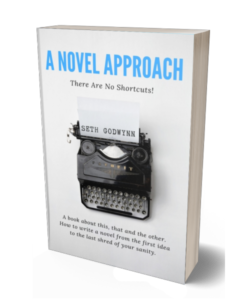Why not planning your novel is a waste of everyone’s time
Seth Godwynn
Another debate we see these days is between authors who think that planning their novel is the best approach, versus the people who think they can just sit down in front of a laptop and pour out a best-selling novel. We all know which one is right, because it’s patently obvious, and it’s equally obvious why the debate continues.

But let’s begin with a purely hypothetical situation. You have to build a house. Would you bother designing it, working out the best place to put it, lay out the electrical and water connections, investigate the best materials to use depending on the needs of the local environment and obtain the proper permits? Or, would you simply get a big pile of bricks, and see what happens?

Well, creating a proper, well-written novel is a lot harder than building a house, so if the first answer seems like the one to go with, there’s an extra reason why the second is plainly ridiculous.
A well written novel comes together from a huge assortment of elements, all working together to create a journey for the reader to go on. It has to have an intriguing protagonist, one that’s relatable, yet slightly mysterious. We want our questions answered, we want to get to know this person and find out the truth about them. It needs a setting that expresses the tone of the work. Will it be realistic or fanciful, will it enhance the experience of the story? We need a plot that knows when to move, and when to slow down to give us time to absorb the events. It needs metaphors, themes and foreshadowing, to draw us into the narrative experience.
A slipshod story can’t have those things, because if you don’t know where you’re going, how can you possibly plan them, and weave them into your tale? The simple answer is that you can’t.
For a novel to work, it has to satisfy the reader. It has to engage their interest with intriguing questions, and then slowly answer them in fascinating ways as we slowly build to a climax that we, hopefully, didn’t entirely see coming. The only way for that to happen is with planning.
So, who are the people saying that it’s OK to ‘just write?’
What kind of mentality lies behind the idea that you don’t need to plan anything? Well, the simple answer is that it stems from a lack of maturity, and a troubling disconnect with the real world. We all know that we need to plan things. Whether it’s a business, a holiday, a trip to the seaside or a day of chores around the house, all of these things need a plan.
As we become adults, we learn that things need to be done properly, if we don’t want them to fail. We put aside the childish notion that we can carelessly throw ourselves into things with reckless abandon. That’s the province of the child, who knows they have parents behind them, carefully watching over their every action.We later grow out of the idea that we can just give it a half-arsed go, and it will probably be fine. That’s the attitude we have as teenagers, when the world expects nothing more of us than to learn the lessons life is teaching us. Those years are meant to be a safety net between our childish years and our adulthood, a time for us to adjust.
But as adults, we know that we have to do things the right way, or face consequences. Nobody is going to be there to give us a hug when we fail. we’re now responsible for our own actions. This is why adults go to jail for things, and children don’t.
Sadly, the mentality of the ‘just write it’ advocates hasn’t reached the emotional maturity of an actual adult. This is a growing problem in modern times, where we increasingly just trust the government, the media and the authorities to take care of us, and don’t take responsibility for our own lives. How is that working out for people now?
It doesn’t work in the real world, and it doesn’t work in writing.
But how much planning should you do? Well, the simple answer is that you should do enough. It depends on your story, and it depends what your level of experience is.
For instance, imagine that you’re having to go to the shop to buy some milk. Of course it needs some degree of planning, you’re going to need shoes and to take your keys with you. If you’re planning to drive then it’s probably a good idea to be licensed to operate a vehicle… and actually own one.
But all this is fine, because you’ve done it so many times that you don’t need to plan out every detail. You’ve done the work, you’ve put in the time and you know how to go to the shop and buy milk. A child needs to be reminded to put on their shoes, to put on their seatbelts and to be quiet and stop annoying me. Adults don’t.
By the same measure, the more experienced the author is, the less they’ll need to plan each detail. Instead, they’ll be able to ignore the things they’re good at and expand into more difficult areas, improving their skills as they go.
So the planning you need is dependent on you, and the work you’re producing. But, if anyone tells you that you don’t need to bother planning, challenge them to find one piece of good quality literature that someone wrote without doing so. If that story contains a plot, well-rounded characters, a satisfying ending, a strong theme, sub-plots that foreshadow the conclusion, metaphors and interesting questions that are answered during the protagonist’s story arc, then it was, without a shadow of a doubt, planned.

These people are publishing their work on self-publishing platforms with no barriers to entry and they are ruining the reputation of the industry. People are ignoring the writing of real, serious indie-authors who are putting in the work and are creating novels of a professional standard. This is the main reason that the readers of today are so wary of our work, and their caution is justified.
There people are hurting everyone’s reputation and aren’t helping themselves while they’re doing it. What I’ve found the hard way is that you can’t reason or argue with them. They’re not ready to hear that they need to work hard to reach their dreams. We have to simply let them waste their time until they figure it out for themselves. It’s their time to waste, and yours is more precious.
Many thanks for reading this article. We hope it was interesting, informative and entertaining. Follow us on social media or share our content on your own pages. It helps us grow so we can create more free content to help you.

